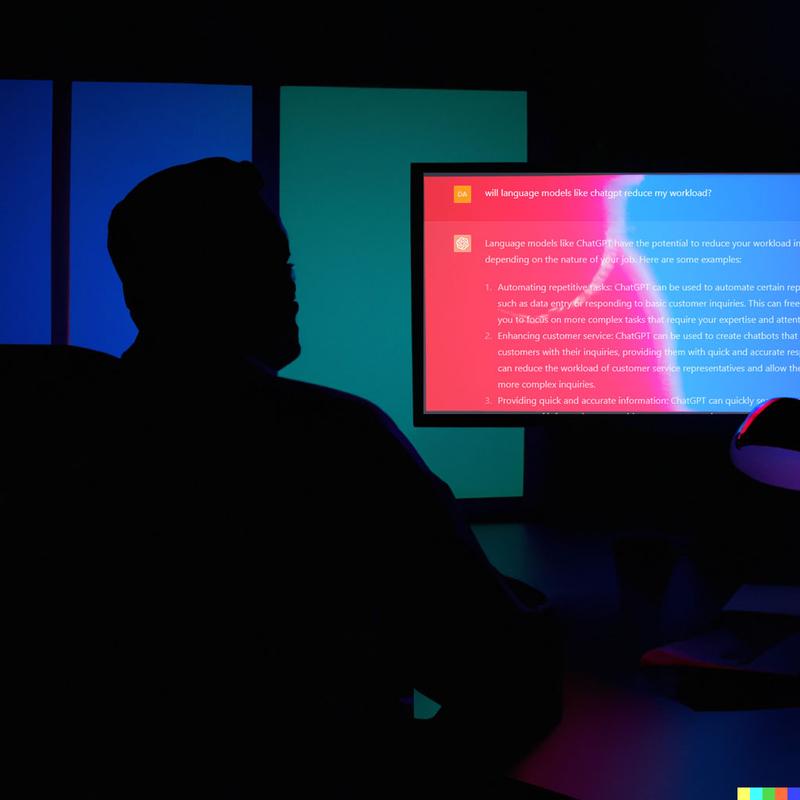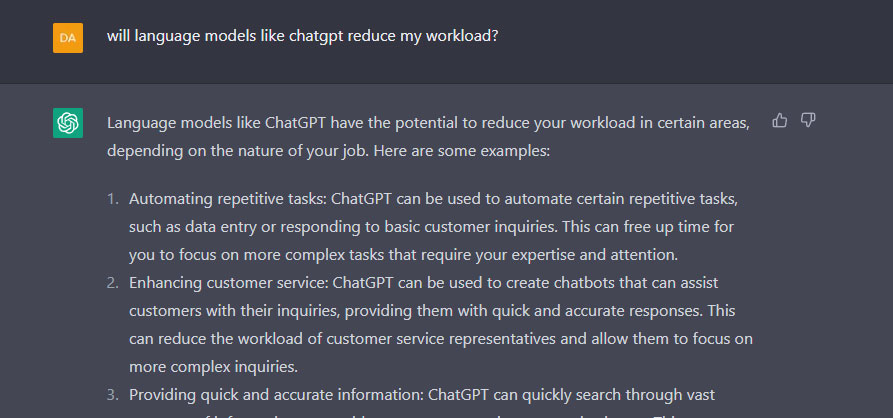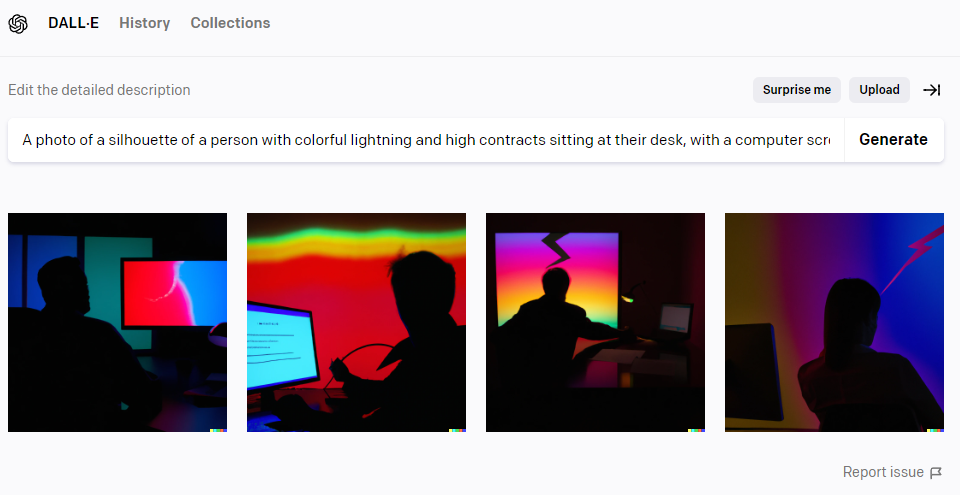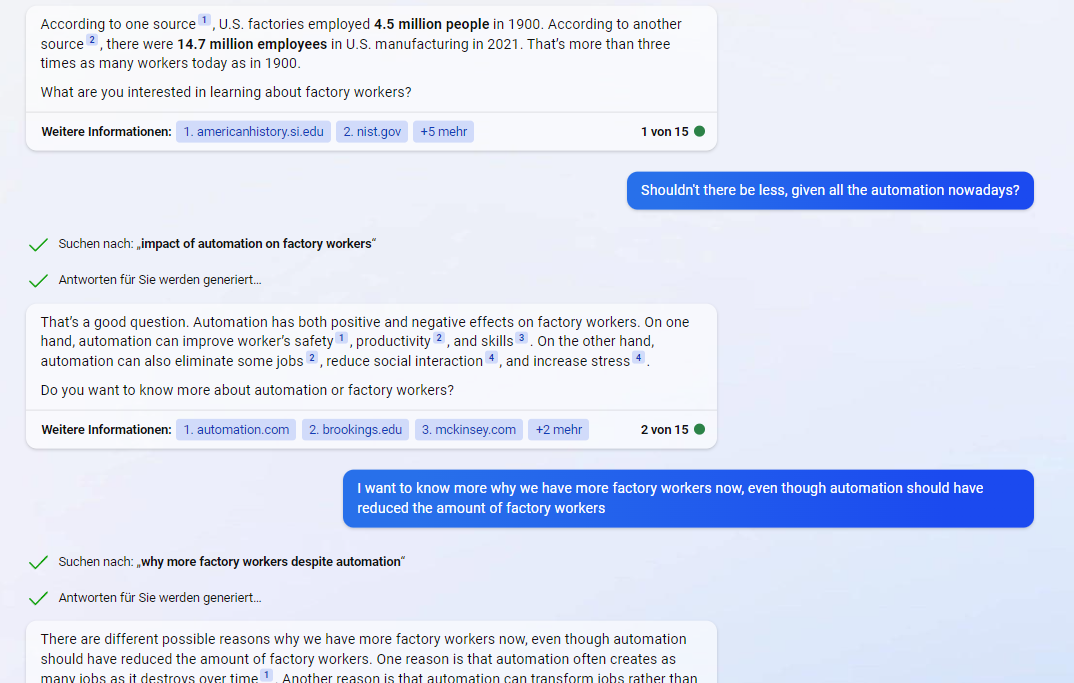Why AI will not have the impact you expect
Posted | Reading time: 7 minutes and 6 seconds.

A lot has been said about the impact of AI on our work life already. Most of them seem to be focused on how they will replace you and your job 1 2, from the white-collar workforce all the way up to the CEO 3, which indeed produces excellent headlines. The other half envisions a future where we no longer have to work and can live in endless otiosity.

ChatGPT answering a question about workload reduction to its best capabilities, and wrongly in my opinion
To really understand the impact, though, it might be interesting to take a look back and remember the old saying:
“All of this has happened before, and it will all happen again.”
J.M. Barrie , Peter Pan
As much as we love to feel special in our current times, the reality is that the introduction of new, disrupting technologies has been the normal, not the exception, during the development of humankind. So let’s use what has happened in the past and take it to extrapolate the impact into the future for our current situation. Even though the outcome is probably much more boring than the visionary and doomistic statements because we already know the effects, as it doesn’t open up a whole new and different world.
We are going to take a look at two different scenarios, households and factories. Both have had significant technological disruption, leading to increased productivity and quality of life for the workers.
Let’s start with the household, whose evolution has had a major impact on the daily chores people perform at home and in our society. As Jeremy Greenwood shows in his Book Evolving Households 4, new technologies enabled females to enter the labour market by reducing the time required in the household. This is a very similar impact as we currently assume for Artificial Intelligence. However, as they could now enter the workforce, their free time did not increase; it was merely substituted with different work. On top of it, the expectations for household work rose. Rather than washing your clothes once a week, the expectation became to have clean clothes daily, which became a double-edged sword for women quickly. Not only are they required to do the work in the labour market they just entered, but they are also required to uphold higher standards in technology-enabled household chores. 5
Life didn’t become more stress-free, but actually more stressful.
There are also many other factors; for instance, while the workload didn’t reduce, the amount of manual labour did, improving the life for many. Introducing the new technology also profoundly impacted our environment; in the US, it accounts for 8% of households’ greenhouse gas emissions. 6
In factories, the story evolved differently and yet likewise. Let’s take a look at the numbers. In the United States, 4.5 Million people were employed in factories in 1900. 7 With all the technological advances coming in, based on the storyline that automation destroys jobs, it should be less today. Still, in reality, the number today was 14.7 Million people in 2022. 8
The reason is simply that the new work begets more work. Automation often creates as many and more jobs as it destroys due to the new applications and possibilities it provides. 9 For the workers, automation improved both their safety 10 and their products 11. As productivity increased, so did the workload. Simple tasks were less, and the remaining work got more difficult and diverse. Ultimately, people have to invest more time into self-development, and the skills demanded of them are ever-increasing. 12
Technological advances have never led to less work. On the contrary, it required us, as humans, to learn even more and to work more efficiently and effectively. It puts us on a hamster wheel of performing better and faster.
Take this article, for instance. An AI didn’t write it, but I did use a lot of AI to create it. The featured image, for example, was created by DALL·E.

Creating the cover image for the article with DALL·E
I did change it afterwards, adding a chatgpt chat window to it. Still, it allowed me to quickly develop something that fits the article without having to search for it or create it myself, looking professional enough for the 5 minutes I invested.
Similarly, this article emerged from a discussion with the Bing Chat Bot. And all the many articles I could link as a source of my thoughts were examples Bing pointed me to. But, of course, some weeks ago, my research would have been in a web search, too. Finding results and getting a good idea and summary of what they were about would have taken much longer, though.

This very article started with a conversation with the Bing Chat
Talking to the chatbot answered only some of my questions. Still, it pointed me to the answers to my questions much quicker and with higher quality results than I was used to. A blog post like this would have usually required some days or even weeks of thought and research; probably, I wouldn’t have published it even because I’d be already working on the next blog post (oh, soo many unfinished articles are hidden behind the curtains here).
And to ensure that the article is readable and pleasing, I put it into another AI, grammarly, to ensure that my non-native English, with all its grammar and spelling errors, is not keeping you from enjoying this blog post.

Proofreading this Article with yet another AI, Grammarly
Now, I can finish a decently-researched article in a few hours. As more and more people take on such a workflow, the less acceptable it will become not to take this route. People who can’t afford (or are otherwise unable to use) such tools will receive less audience for their posts. They will not be able to post in a similar cadence, losing the audience to others. While those that can face an ever fiercer competition of people that can create more quality content ever easier.
This is where this change will take us. Our work will not get less. On the contrary, the support provided by AI will accelerate the velocity with which we will deliver solutions and products at work. And we will not only deliver faster but a better quality will be expected from us, too.
Take software development, for instance. As the saying goes:
There are only two hard things in Computer Science: cache invalidation and naming things.
Phil Karlton
Naming things, in particular, can take longer than a non-programmer would think. The name must be short and self-documenting so that a developer ten years from now can quickly grasp its intent. An AI can now instantly generate a suitable name, and what required many discussions and thoughts in the past is done in a second.
Another topic is documentation. Keeping the documentation in sync with all the ongoing changes can take considerable effort in a large software project. An AI, on the other hand, can generate new documentation on every change in real-time.
And this continues to the process of code creation itself. Github copilot gives a glance at this already. As the creation of source code becomes increasingly routine, developers will instead learn to abstract their work so that what the AI creates matches the requirement well.
Creating the perfect name for their newest class and its implementation will become as easy as it was for me to create an image for this blog post.
As this happens, fewer projects will be able to stick to the traditional ways as their competitors outpace them.
More complex solutions will be achievable as the developers can focus more on the system and less time on the code. Existing system landscapes with many different services - for instance, in traditional Enterprise IT - can be integrated with much lower costs, allowing organisations to leverage their systems in far more sophisticated ways.
All of this will change job profiles quite a bit. But it will not make any jobs obsolete or lead to unemployment, nor will it give people more free time. Quite the opposite; with the chances to reduce a lot of OPEX in their organisation, companies will create many more jobs. And those jobs will require more knowledge than before and people capable of working on a high level of abstraction while still being aware of the gears and levers of the systems that the AI automates.
All of this will be so boringly normal that in a few years, we will almost have forgotten how significant the change really was. Instead, we will look back at today and yearn for our hopes of less work and stress.
-
A video game company made a bot the CEO, and its stock climbed ↩︎
-
MIT Press - Evolving Households - The Imprint of Technology on Life ↩︎
-
National Museum of American History - 1870-1900: Industrial Development ↩︎
-
Brookings - Understanding the impact of automation on workers, jobs, and wages ↩︎
-
Automation.com - The Impact of Industrial Automation on Worker Safety ↩︎
-
Harvard Business Review - Automation Will Make Lifelong Learning a Necessary Part of Work ↩︎
